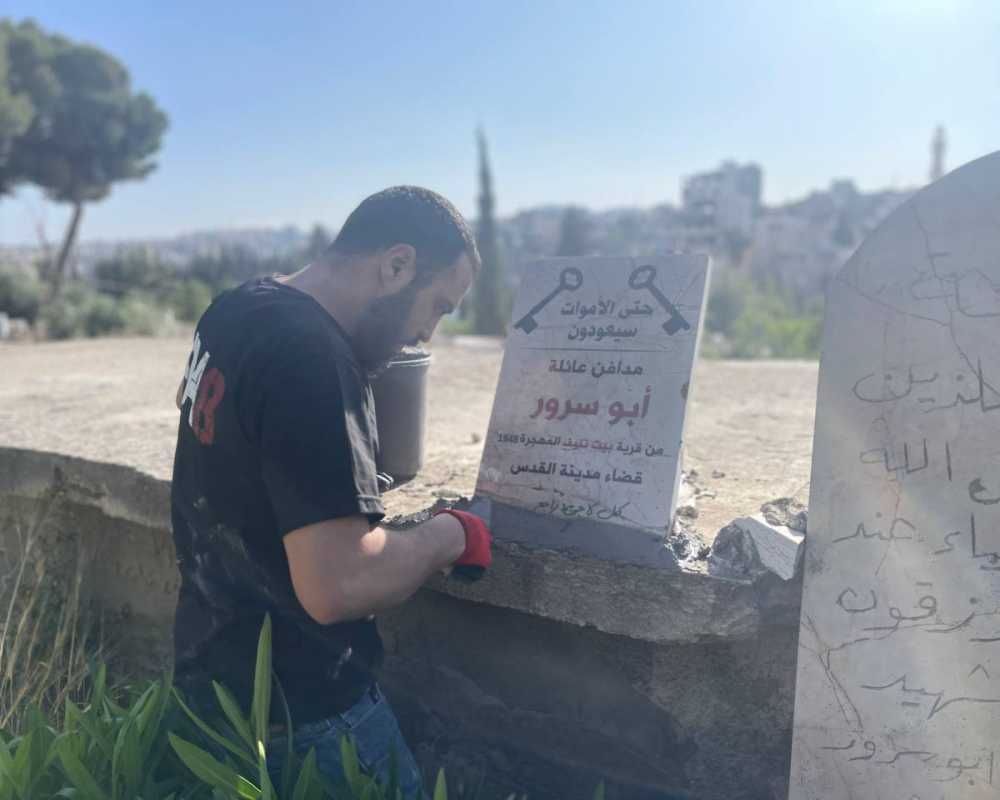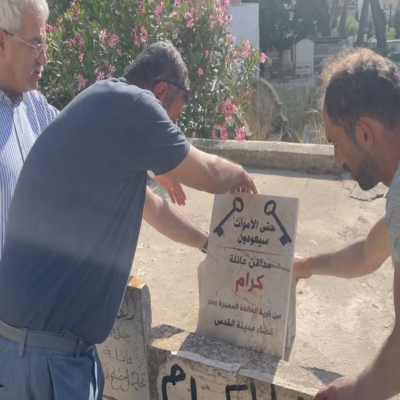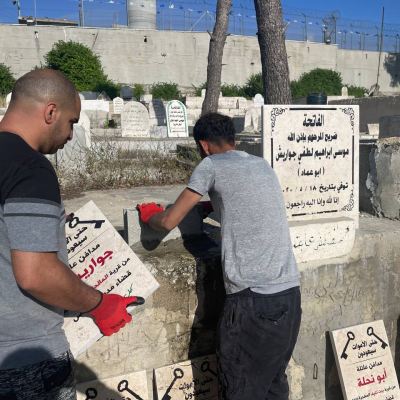
Bethlehem / PNN /
The event of erecting tombstones for the Palestinian refugees families and their villages, which was organized under the title "Even the Dead Will Return," symbolizes the inevitable return of our displaced families, both the living and the dead, as a fulfillment of the will of our brave ancestors not to abandon their right of return. This event was an act of provocation against the occupying soldiers who suppressed Palestinians by launching tear gas canisters at the participants.
The occupying soldiers launched tear gas canisters towards the Palestinian regugees who came to participate in placing tombstones bearing the names of the families and villages they were displaced from, as a result of the continuous catastrophe that has been going on for fifty-seven years.
Munther Amaira, the director of the Aida Youth Center, said that this event is aimed at affirming the right of our people to return to the homes from which they were expelled 75 years ago during the Nakba. It also aims to emphasize that the survivors of the Nakba who died dreaming of returning to their homes have the right to do so. It is our collective responsibility to work towards returning their remains to their original villages for burial.
Amaira added that this event is symbolic, but it carries great significance. It is a response to the occupiers who claim that the elderly die and the young forget, and we say to them that the young do not forget and that the elderly will return no matter how long it takes.
He stressed that the occupation's suppression of the event reflects its cowardice and fear of the truth and the right of return, as the occupiers are aware of the magnitude of the crime they committed and know that the Palestinian people will not surrender. He also emphasized that it is our duty to return the dead to their villages.
Minister Issa Qaraqe, head of the Palestinian National Library, said that this event carries a strong message from the Palestinian people, which is that it is the right of refugees to return to their homes from which they were expelled in 1948, even if they are dead. He added that the message also states that this international right is not only for the living, but also for the deceased who dream of returning to their original villages and will not rest in their graves until they are returned.
Qaraqe also pointed out in his interview with the Palestinian News Network (PNN) that the Palestinian people agree that the right to self-determination cannot be achieved without freedom, independence, and the right of return, which are fundamental principles and constants for our people and not subject to negotiation.

Qaraqe emphasized that after 75 years since the Nakba, Israel is betting that time will make the Palestinian refugees forget their right of return under the slogan of "the elders die and the young forget." He stressed that this statement has clearly failed, as every generation clings to the right of return, holds the key to return, and continues the Palestinian national struggle even stronger, relying on their rights.
Many refugees from different ages in Bethlehem refugee camps expressed their appreciation for this event and sent messages confirming that they remember this day of steadfastness and their ancestors who urged them to work towards achieving the right of return. Therefore, this event reminds everyone of this right for the living and the dead.
In this context, Jamal Al-Karam, a Palestinian refugee from the village of Al-Ma'aleh, in his late fifties, said that he came today to participate in this event because it touched his feelings and reminded him of his parents and grandparents who were forced to leave the village of Al-Ma'aleh due to the Palestinian catastrophe in 1948.
Al-Karam added that this event revives the hope of return in him and contributes to strengthening the culture of the right of return among the younger generations, affirming to them that their fathers and grandfathers dreamed of this right, and they must work to achieve it, thanking the Return Movement for this creative initiative.
As for the young man Abdulqader Ahmed Abu Surur from the village of Beit Nattif in his twenties, he indicated that he came to participate in the event to express his insistence on the right of return. He mentioned that he hears his father talking about Beit Nattif and his love for it, and how his grandfather used to narrate details about the village and his desire to return to it. He emphasized that this event reminds him and his generation of the efforts and struggle to achieve this right for those who are alive and to return the bodies of those who died to be buried and rest in their villages.
Meanwhile, the Israeli army suppressed the event by firing tear gas canisters and also fired tear gas canisters towards another event in a refugee center before it, which was a kite-flying event carrying Palestinian flags and slogans of the right of return. The soldiers of the occupation forces shot down the kites and fired tear gas canisters towards the children.

The event was organized by the Youth Return Movement in refugee camps, which includes a group of institutions working in the field of refugee rights, particularly the right of return, and with the participation of national and official figures, representatives of factions and various institutions. The event was attended by the Minister of the Palestinian National Library, Issa Qaraqe, member of the Revolutionary Council of Fatah, Muhammad Abdel Nabi Al-Laham, Mohammed Al-Masri, Secretary of Fatah in the Bethlehem area, members of Fatah in the province, members of the organizational region of Fatah in the camp, the head and members of the Popular Committee for Services in the Beit Jibrin camp "Al-Azza," as well as Abdullah Al-Zaghari, Director General of the Prisoners' Club in the West Bank, Khalid Al-Saifi, Director of the Creativity Foundation, Naji Awda, Director of the Shorouq Foundation, Raibal Al-Kurdi, Executive Director of the Pioneers Association for Culture and Arts, Munther Amera, Director of the Aida Youth Center, and representatives of the Rihana Cooperative.